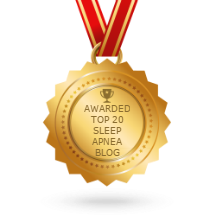Tag Archives: sleep disorder

Is It Possible To Sleep Through Insomnia?
Insomnia:
YOU know you’ve been awake for hours, but you dare not check the little electronic numbers on your bedside clock for fear of inducing a wave of panic.
You don’t need to look anyway, because you know exactly what they will say: “It’s early in the morning and you will be exhausted tomorrow.”
Your partner’s snores are usually a mere irritant, but in that quiet, liminal world of insomnia they take on a horrific, maddening dimension. Why can everyone else sleep except you?
If these mental roundabouts sound familiar, then take heart: you are most definitely not alone.
In homes across the state, there are plenty of Victorians burning the midnight oil, not because they have a herculean-like stamina, but because they are at war with their desperately tired bodies that refuse to drift off to sleep.
So, what exactly is insomnia? And how do you know if you have it or are just going through a phase?
Insomnia is defined in the fifth edition of the American Psychiatric Association’s Diagnostic and Statistical Manual of Mental Disorders as difficulty getting to sleep, staying asleep or having non-restorative sleep (despite opportunity for sleep), together with associated impairment of daytime functioning, with symptoms being present for at least four weeks.
Dr David Cunnington, Melbourne Sleep Disorders Centre director, differentiates between two types: acute and the less-common chronic iteration.
“Acute insomnia is where there are a certain set of circumstances that are causing sleeplessness, such as stress or illness, and this could last for a few days, sometimes a few weeks, but after that it passes,” Cunnington says.
To read the rest of this article, click here:
You can buy CPAP Machines, tubing and all of your CPAP supplies at CPAP America, 707 Mantua Pike, West Deptford, NJ 08096. Feel free to contact us at 1-800-569-0167.
You can also reach us via email here.
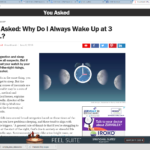
Waking Up From Sleep At 3 A.M.? You’re Not Alone
Age, indigestion and sleep apnea are all suspects. But if you can set your watch by your middle-of-the-night risings, blame alcohol.
It all results in the same thing: you just can’t get to sleep. But the underlying causes of insomnia are multiple, and it may be a mix of biological, medical and psychological issues, explains Michael Perlis, director of the Behavioral Sleep Medicine Program at the University of Pennsylvania.
Insomnia falls into several broad categories based on those times of the night when you have problems sleeping, and these tend to align with predictable triggers. “A general rule of thumb is that if you’re struggling to fall asleep at the start of the night, that’s due to anxiety or stressful life events,” Perlis says. Environmental issues—like a too-bright room, or staring at device screens—can also mess with your ability to fall asleep.
On the other hand, Perlis says depression is linked with “late insomnia”—the kind that wrests you from sleep so late in the night that you’re forced to rise early for the day.
When it comes to “middle insomnia,” which forces your eyes open a few hours after you’ve fallen asleep, Perlis says two common medical conditions are often to blame: gastroesophageal reflux disease, or GERD, and sleep apnea. “In the case of sleep apnea, you wake up because you’ve stopped breathing,” he explains. “With GERD, you wake up because stomach acids are burning your esophagus.”
Even the healthiest sleepers wake a few times during the night, though for the most part you’re not awake long enough to remember them, Perlis says.
To read the rest of this article, click here:
You can buy CPAP Machines, tubing and all of your CPAP supplies at CPAP America, 707 Mantua Pike, West Deptford, NJ 08096. Feel free to contact us at 1-800-569-0167.
You can also reach us via email here.
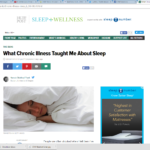
Losing Sleep Affects Thyroid Issues
Sleep Lessons For People With Chronic Illness
People are often shocked when I tell them I’ve never pulled an all-nighter in college. They’re more shocked when I tell them I average around seven hours of sleep a night.

Want to Sleep Better? You Might Want To Try This
Sleep better just by going outside?
Want to sleep better? Go outside, recommends a new study.
A recent University of Michigan study found, unsurprisingly, that getting outside during the day helps people fall asleep more quickly and get more shut-eye at night. Indoor light isn’t quite as helpful as actual sunlight.

Do You Sleep Well On Your First Night In A New Place?
When you check into a hotel room or stay with a friend, is your first night of sleep disturbed? Do you toss and turn, mind strangely alert, unable to shut down in the usual way? If so, you’re in good company.

The State Between Consciousness And Sleep
There is a brief time, between waking and sleep, when reality begins to warp. Rigid conscious thought starts to dissolve into the gently lapping waves of early stage dreaming and the world becomes a little more hallucinatory, your thoughts a little more untethered. Known as the hypnagogic state, it has received only erratic attention from researchers over the years, but a recent series of studies have renewed interest in this twilight period, with the hope it can reveal something fundamental about consciousness itself.
Traditionally, the hypnagogic state has been studied as part of the sleep disorder narcolepsy, where the brain’s inability to separate waking life and dreaming can result in terrifying hallucinations. But it’s also part of the normal transition into sleep, beginning when our mind is first affected by drowsiness and ending when we finally lose consciousness. It is brief and often slips by unnoticed, but consistent careful attention to your inner experience after you bed down can reveal an unfolding mindscape of curious sounds, abstract scenery, and tumbling thoughts.
This meandering cognitive state results from what Cambridge University researcher Valdas Noreika calls a “natural fragmentation of consciousness” and the idea that this can be tracked over the early minutes of sleep entry is the basis of recent hypnagogia research.
To read the rest of this sleep related article, click here:
http://www.theatlantic.com/science/archive/2016/04/deciphering-hypnagogia/478941/
You can buy CPAP Machines, tubing and all of your CPAP supplies at CPAP America, 707 Mantua Pike, West Deptford, NJ 08096. Feel free to contact us at 1-800-569-0167.
You can also reach us via email here.
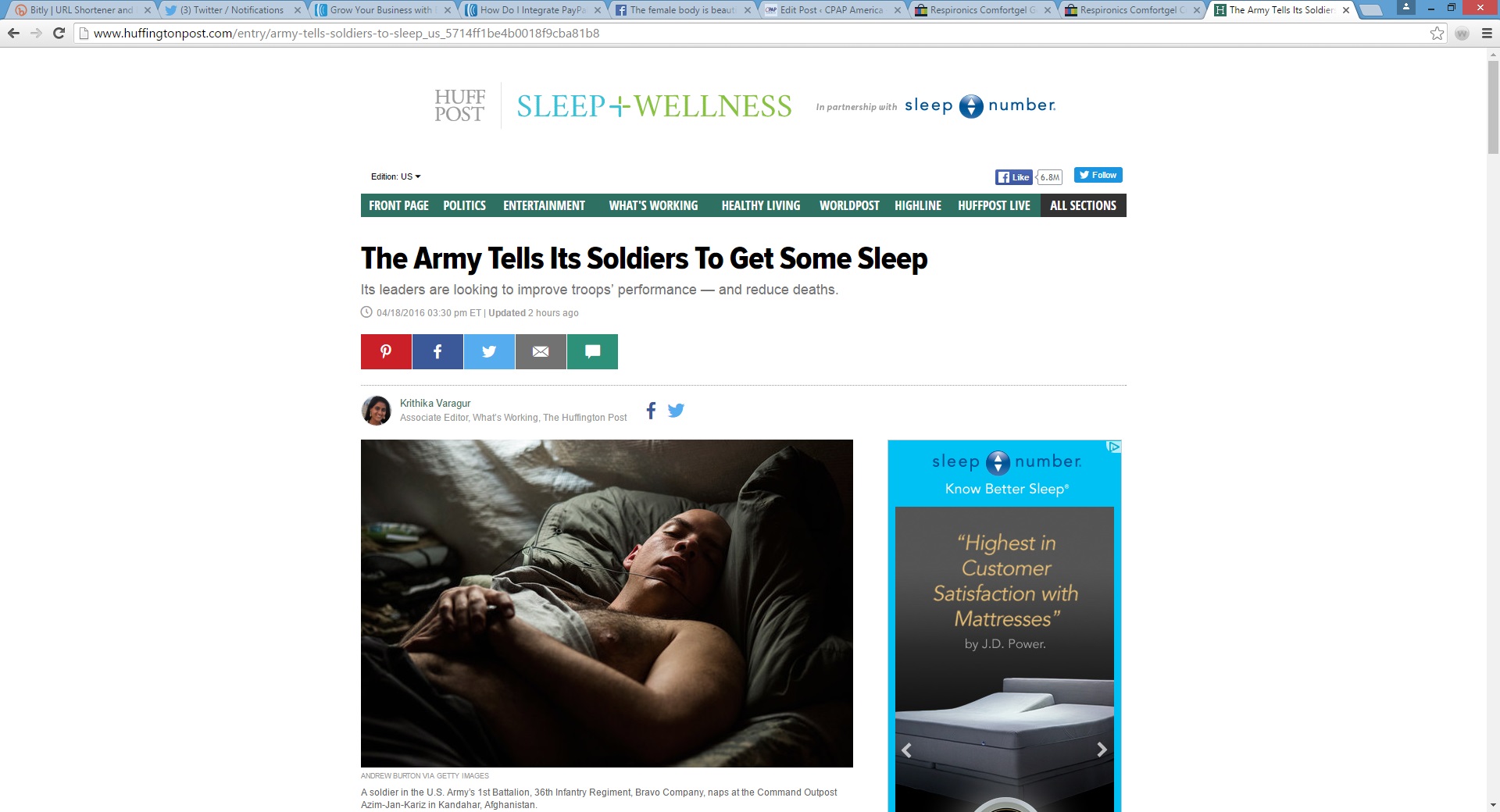
Army Looks To Improve The Sleep Of Their Soldiers
“In the Army, we do more before 9 a.m. than most people do all day” is a standard bit of military bravado. It’s as much about the discipline instilled in soldiers as it is about the fact that their strenuous training takes place under less-than-ideal health conditions — like waking up before dawn to exercise, which can create a cycle of sleep deprivation.
That’s partly why 10 percent of active duty soldiers have a diagnosed sleep disorder, and almost half have a “clinically significant” sleep disorder, according to a report the Army released last year. And fatigue was a contributing factor in 628 Army accidents and 32 soldier deaths between 2011 and 2014.
Now, the Army is trying to change its sleep culture with a wellness campaign called the Performance Triad, which is based on three pillars: nutrition, exercise and sleep.
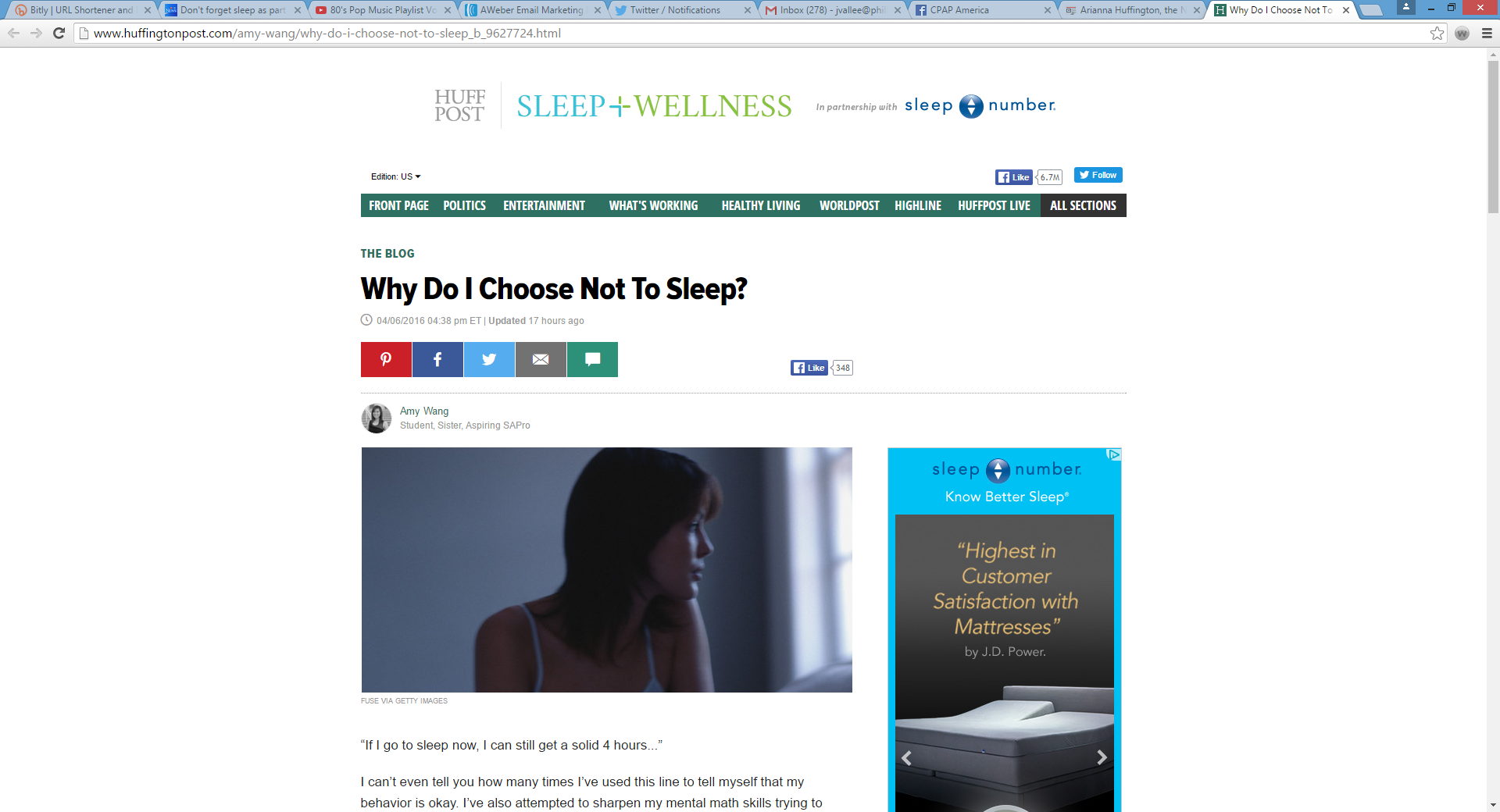
Why Don’t We Make Sleep A Priority?
“If I go to sleep now, I can still get a solid 4 hours…”
I can’t even tell you how many times I’ve used this line to tell myself that my behavior is okay. I’ve also attempted to sharpen my mental math skills trying to figure out the latest possible time I can go to sleep to get four hours of rest. It’s a minimum I’ve determined myself, a number of how many hours I believe I personally need to function. But I can never seem to get it right because I make these decisions when I’m already sleep-deprived, which leads me to poor choices and staying up until I only have four hours left.
So what happens? I wake up feeling sluggish.
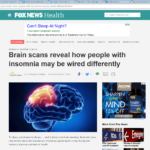
Insomnia sufferers may have abnormal brain activity
To sleep, perchance to dream … and to keep your brain working: Scientists have long known about the importance of getting a good night’s sleep to improve memory, learning and mental health. But the underlying cause of primary insomnia — a chronic inability to sleep soundly that’s not associated with the use of stimulants, or medical disorders such as depression — has eluded researchers.
Now, a small study comparing healthy participants to patients who have primary insomnia has found that the people with insomnia have weakened neural connections to and from the thalamus, the region of the brain that regulates consciousness, sleep and alertness.

What exactly happens to your brain on no sleep?
Bedtime is one of the most important parts of the day for the brain. The latest studies show that when we slumber, the brain performs important housekeeping tasks that clear away the debris of the day’s work and help reset and restore nerve networks so they are ready to operate again at full capacity when we wake.
But a lack of sleep deprives the brain of this essential rest period, and our ability to get through the day might be compromised. In a small study published in the journal Radiology, a team of Chinese and European researchers report a more detailed analysis of how insomnia can affect specific types of brain nerves in parts of the brain that regulate cognition, emotion and sensory processes.

